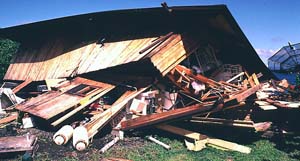The earthquake that hit the lower Midwest on April 18 of this year was a hearty 5.2 on the Richter scale and got the attention of the St. Louis region. What if a larger quake — occurring either in the New Madrid Fault or Wabash Valley Fault — were to hit the region? How would we respond?

To address these concerns, the Department of Mechanical, Aerospace and Structural Engineering at Washington University in St. Louis is presenting a series of seminars and workshops on the topic of reducing the damage that could occur if a strong earthquake strikes the area again. The program will cover the subjects of hazards, codes, vulnerability and strengthening of infrastructure. Speakers include practicing engineers, professors and officials with wide experience in seismic hazard mitigation, especially in Missouri and the surrounding vulnerable region.
“Damage Reduction through Preparedness” is targeted toward an invited audience of public officials at the local and regional level.
The second seminar (the first was held at WUSTL in Feb. ’08) and workshop in the series will be offered Tuesday, August 19, 2008, in Room 100 Whitaker Hall on the Washington University in St. Louis Danforth Campus. The seminar will go from 8 a.m. to 1:30 p.m. It is sponsored by State Farm Insurance.
Admission to the event is by invitation only. Contact: Renee Pearl (314) 935-7926. Media are encouraged to attend to conduct interviews.
“The earthquake threat to Missouri and to much of mid-America is severe, both in terms of loss of life and economic damage,” said Phillip L. Gould, Ph.D., Harold D. Jolley Professor of Civil Engineering and one of the seminar organizers. “Our intent is to raise awareness about earthquake hazards and preparedness. The sharing of disaster plans between public and utility sectors will enhance awareness and preparedness for the next major event.”
“Earthquakes are the only natural disasters that hit without warning,” said St. Louis City Director of Public Safety Charles Bryson. “Due to the destructive nature and ability to tax all systems, especially emergency systems, it is critical that we continually prepare not only first responders, but the general populace as well for this type of emergency.”
The full agenda plus keynote speakers and presentation topics and directions to campus, is posted on the website: http://www.me.wustl.edu/seminar.
All participants in the seminar and workshop will receive handout materials based on the speaker’s presentations. Similar materials will be available on the program’s Web site.